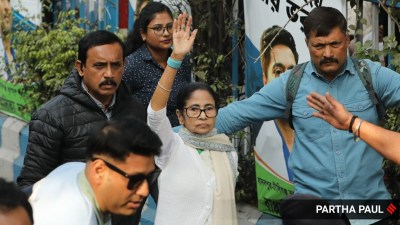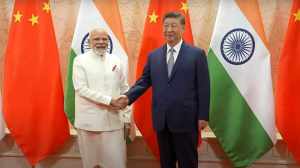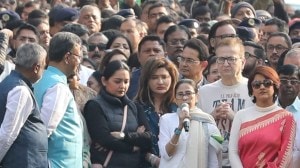At sarkar146;s tender mercy
BSNL8217;s GSM expansion is held up by ministerial wranglings. And therefore Bharat can8217;t get through to India

Kawas and Malwa came, literally, as midnight calls. The two Barmer villages that were to make national headlines for getting flooded informed me about the disaster through calls well past midnight. Kheraj was barely clinging on to his roof as he called me, the waters swirling around him. And the Malwa call came from the village mosque.
When I first picked up the mobile I couldn8217;t quite comprehend the number on the screen. Kawas was on the mobile network as I knew it. And in rural India mobile network means BSNL. And since the Kawas number was known, it was easy to pinpoint the call. But it was the Malwa one that bothered, since I couldn8217;t place the service provider. Until then Malwa was known as the best milk producer and for the fact that one of its boys had gone on to become an IG of Police. But now it was to be the village to experience the worst disaster to befall the desert. By morning both numbers died out, but the Malwa one bothered me no end. Months later, at BSNL8217;s state-level interaction with parliamentarians, I raised this issue, only to find a perplexed headquarters. The entire hierarchy looked embarrassed when it was confirmed to them that a private service provider played a major part in rescue operations when BSNL was not even providing coverage in that area. They promised action, and soon.
I cite this example of, literally, life and death. And the importance of communications. In any disaster relief operations, the first things you8217;d see will be army jawans with their ANPRC sets, making contact with outlying areas and gathering more information. And the reason I cite the Malwa example is I lived that call and all that followed. I also cite this example because there is an enormous demand for BSNL coverage in the area. Rural India depends on BSNL for its network. And in a situation such as Malwa, BSNL did not exist. It was perplexing, but what happened at BSNL in the past few months is even more perplexing, and distressing.
At the end of the state level BSNL meeting at Jaipur it was decided that Barmer should be fairly treated and get the network it deserved. For, with massive oil found, there was good economic sense in that network expansion too. The mystery of the private service providers can be found in the oil discovery. They followed economic logic, and even covered areas of the district where there was no oil. The figure arrived at for Barmer was 32 additional towers so as to cater for the desired expansion of the network. And I could go back and tell the constituents that BSNL 8220;ka ashwasan aa gaya hai8221;.
That was then, and now is now. The number of towers has not increased, neither has the work on other services. The economic sense displayed by the private players in Barmer does not seem to have made much of an impact on the cabinet managers of the Government of India. The prime minister watched his bright young cabinet colleague swallowed up by an intra-party tsunami. His exit was followed by that of a cabinet decision, which leaves parliamentarians representing rural constituencies deeply concerned.
There is of course a systemic 8212; and ethical 8212; concern about a cabinet decision being tossed out of a Chennai window, along with the minister concerned. Are cabinet decisions to be overturned by non-cabinet members? As per the Constitution, 8216;communications8217; remains a federal subject. As does the choice of who occupies that office. But amongst the many strange spectacles witnessed in the 14th Lok Sabha, this would certainly make it to one of the seven wonders.
I am, of course, connecting the flooding of Malwa to the mauling of Dayanidhi Maran by his own party. And I am of course connecting those 32 pending Barmer BSNL towers to the infamous GSM tender business. Like me, most of my colleagues couldn8217;t be bothered who negotiated what price for the contract. What matters to us is that the decision was taken, and we looked forward to its implementation. The network would expand, more area would come under coverage, and the villager would benefit by better communication facilities. It isn8217;t readily understood, but there is a direct correlation between expanding telephony and the declining importance of krishi mandis. The farmer with a telephone gets to inquire and negotiate directly with the buyer. So for a government that swears by the village and its welfare, the Government of India and its bizarre partners have been strangely silent about allowing this BSNL tender business to reach this stage.
In their long march to the power corridors of Delhi, the comrades have always ridden on the backs of various public sector units. By any stretch of the imagination BSNL must rank as one of the best managed PSUs. So when the Bolsheviks keep silent while a UPA constituent lets rip into BSNL, its GSM tender and its global image, there is more than merely the smell of hilsa to this murky business. Imagination does not require a great leap forward to get a handle on this.
As an economics-challenged parliamentarian I need only repeat figures that are easily understood by me, and those like me. When the tender business reached its logical conclusion, BSNL ranked as the second largest service provider in the country. Many of its 21 circles were virtually jammed, but it did suggest hope. But as the tender took care of its minister, and since then stopped BSNL in its tracks, the great PSU has slipped to fourth in the national list. While all have shown double-digit growth in this period, BSNL has barely made it to a single digit.
While the corporates slug it out through other means, the parliamentarians wait for that tower added, and those villages covered. The Government of India forfeits its constitutional roles and responsibilities. The Bolsheviks treat all these resources as they did the sovkhoz and kolkhoz. In the meanwhile hundreds of Malwas await their tower.
The writer is BJP MP from Barmer
- 01
- 02
- 03
- 04
- 05































